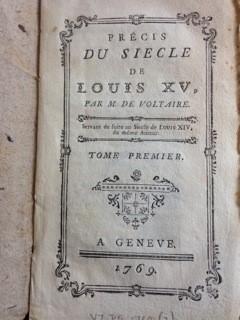PrÃĐcis Du SiÃĻcle De Louis XV on:
[Wikipedia]
[Google]
[Amazon]
 ''PrÃĐcis du siÃĻcle de Louis XV'' (''Short history of the Age of Louis XV'') is a historical work by the French philosopher and author
''PrÃĐcis du siÃĻcle de Louis XV'' (''Short history of the Age of Louis XV'') is a historical work by the French philosopher and author
"Voltaire, Historian of Modernity"
The Voltaire Foundation, University of Oxford Works by Voltaire 1768 books {{nonfiction-book-stub
 ''PrÃĐcis du siÃĻcle de Louis XV'' (''Short history of the Age of Louis XV'') is a historical work by the French philosopher and author
''PrÃĐcis du siÃĻcle de Louis XV'' (''Short history of the Age of Louis XV'') is a historical work by the French philosopher and author Voltaire
François-Marie Arouet (; 21 November 169430 May 1778) was a French Enlightenment writer, historian, and philosopher. Known by his '' nom de plume'' M. de Voltaire (; also ; ), he was famous for his wit, and his criticism of Christianityâes ...
, first published in its own right 1768. Celebrating the progress of Enlightenment ideas and the retreat of prejudice
Prejudice can be an affect (psychology), affective feeling towards a person based on their perceived group membership. The word is often used to refer to a preconceived (usually unfavourable) evaluation or classification (disambiguation), classi ...
, it comments on cultural, economic and technological progress made in France during the reign of Louis XV of France
Louis XV (15 February 1710 â 10 May 1774), known as Louis the Beloved (french: le Bien-AimÃĐ), was King of France from 1 September 1715 until his death in 1774. He succeeded his great-grandfather Louis XIV at the age of five. Until he reached ...
.
Background
The material for the ''PrÃĐcis'' had previously been part of a history that Voltaire spent twenty years working on and which included ''Essai sur les mÅurs et l'esprit des nations
''Essai sur les mÅurs et l'esprit des nations'' (translated to English as "An Essay on Universal History, the Manners, and Spirit of Nations") is a work by the French writer, historian, and philosopher Voltaire, published for the first time in 1 ...
'' (''Essay on the customs and spirit of the nations'') and ''The Age of Louis XIV
''The Age of Louis XIV'' (''Le SiÃĻcle de Louis XIV'', also translated ''The Century of Louis XIV'') is a historical work by the French historian, philosopher, and writer Voltaire, first published in 1751. Through it, the French 17th century beca ...
''. The ''Precis'' was introduced in 1762 as an appendix within this larger work, but later published separately.
Content
Voltaire comments on the trial ofThomas Arthur, comte de Lally
Thomas Arthur, comte de Lally, baron de Tollendal (13 January 17029 May 1766) was a French general of Irish Jacobite ancestry. Lally commanded French forces, including two battalions of his own red-coated Regiment of Lally of the Irish Brigade, ...
; a case he had been following closely. Lally had been a successful military officer, and personally known to Voltaire. When Lally was involved at a military defeat, relinquishing the Indian town of Pondicherry
Pondicherry (), now known as Puducherry ( French: PondichÃĐry ĘdĘËtĘÉÉđi(listen), on-dicherry, is the capital and the most populous city of the Union Territory of Puducherry in India. The city is in the Puducherry district on the sout ...
to the English, his fellow officers blamed him. On his return to France, Lally was imprisoned without charge, put on trial in which he was denied a lawyer, and finally executed. In his account of the case, Voltaire wrote, "His character made him detested by all who had to do with him. But that is not a reason for cutting off a man's head. The briefs both for and against him, which I have read attentively, contain nothing but insults, and not the least proof."
The ''Precis'' also praises the courage of the Corsicans in defending against the French at the Battle of Ponte Novu
The Battle of Ponte Novu took place on May 8 and 9, 1769 between royal French forces under the Comte de Vaux, a seasoned professional soldier with an expert on mountain warfare on his staff, and the native Corsicans under Carlo Salicetti. It ...
. Voltaire writes:
The principal weapon of the Corsicans was their courage. This courage was so great that in one of these battles, near a river named Golo, they made a rampart of their dead in order to have the time to reload behind them before making a necessary retreat ĶBravery is found everywhere, but such actions arenât seen except among free people.
References
External links
"Voltaire, Historian of Modernity"
The Voltaire Foundation, University of Oxford Works by Voltaire 1768 books {{nonfiction-book-stub